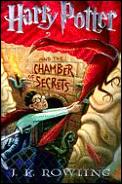
| Series: | Harry Potter #2 |
| Publisher: | Arthur A. Levine |
| Copyright: | June 1999 |
| ISBN: | 0-439-06486-4 |
| Format: | Hardcover |
| Pages: | 341 |
I was really hoping that this book would be better than Sorcerer's Stone. Unfortunately, it's even worse.
To start with, Rowling's botch of Harry's abusive fairy tale past hasn't gotten any better — if anything, it's deteriorated. Neither the narrator nor the teachers at Hogwarts seem to think that Harry being abused by his aunt, uncle, and cousin is of any particular importance or worthy of anything other than occasional sympathy. Harry has another summer of hell, perhaps slightly better than in the past because his aunt and uncle are afraid of him, but then getting worse as he gets into more trouble for something that isn't even his fault. And no one other than his friends his own age appear to even care. This is rather like the Prince intentionally sending Cinderella back to live with her evil step-mother for no in-story reason. It throws me completely out of the story.
Like most nonsensical things that happen in Rowlingverse, the true reason for it becomes obvious when you look at the plot structure of the book. Rowling has built her story and some of her drama on the contrast between Harry's horrible and mundane home life and the wonderful world of wizardry, and clearly each story is starting with the mundane to emphasize the contrast of Hogwarts. So no one who would logically help Harry can be allowed to do so, since it would ruin the structure of the books and take away an opportunity for dramatic tension. When events are this contrived just to create a plot effect, it destroys whatever enjoyment I'd otherwise get from the plot.
That's just one example. Here's another: Quidditch.
Quidditch is presented as the magical equivalent of soccer, the sport that all of the students at Hogwarts are wild about. Briefly, it is played on broomsticks between hoops of goals fifty feet in the air. There are a variety of players and balls on each side, but the important part is the golden snitch, a special ball that when caught gives the catching team the equivalent of fifteen goals and immediately ends the match. One player on each time is dedicated to catching the snitch.
As is obvious to everyone, including all of the students, all of the complex rules of this game are mostly irrelevant compared to catching the snitch. You need an adequate team to at least stay relatively close, but given that, whoever catches the snitch wins, and the Seeker, the player chasing the snitch, is far more important than anyone else on the team.
It shouldn't require a lot of analysis to realize that this game is fundamentally broken. Compare it to any other widely popular team sport, and one immediately sees that the game is inherently imbalanced and full of rules and players that don't particularly matter. The whole thing seems rather pointless unless you throw away attempts to believe in the world and look at the plot of the story, and then it's obvious. Quidditch is a game designed to give Harry Potter a chance to look good.
There's only one position that's important. Guess which position Harry plays? That one player can win games for his team singlehandedly. Guess what Harry does throughout the books? There's one player with a chance for heroic feats of broomstick-flying and get most of the acclaim, which is, of course, the intended outcome for Harry Potter, who in each book goes from a miserable life with his hated aunt and uncle to being the powerful and much-liked hero of his school in Hogwarts. (People have tried to make video games out of Quidditch. Predictably, severe work has to be done to the gameplay mechanics to make anything other than playing Harry Potter and catching the snitch even remotely relevant.)
Anyway, enough of the general criticism of the whole series. This chapter has to feature more of a plot than the last, which was mostly an introduction to Hogwarts and all the characters there, and Rowling dug up one of those incredibly frustrating and artificial plots where the main character is suspected of something horrible due to a string of coincidences, no one listening to anything he says, and a bit of active malice from the people with "bad guy" written over their heads in helpful green letters. Just in case you were worried about having to think or anything while reading the books.
Given that I find this particular plot device horrendously frustrating and completely unbelievable, I unsurprisingly hated this book even more than the last one. Harry always has some convenient reason not to talk about what's really going on, or gets cut off, or the supposedly intelligent adults won't actually listen to him, until finally he and his friends manage to solve the problem by themselves with help from Harry's convenient fairy godmother— er, I mean, the headmaster.
Once again, the only good thing that I can say about this book is that it's technically well-written and well-paced. I think Rowling could tell a good story, but so far these books are getting worse and worse. The next is the first to win an actual SF award, so maybe it will be better.
Followed by Harry Potter and the Prisoner of Azkaban.
Reviewed: 2004-11-24